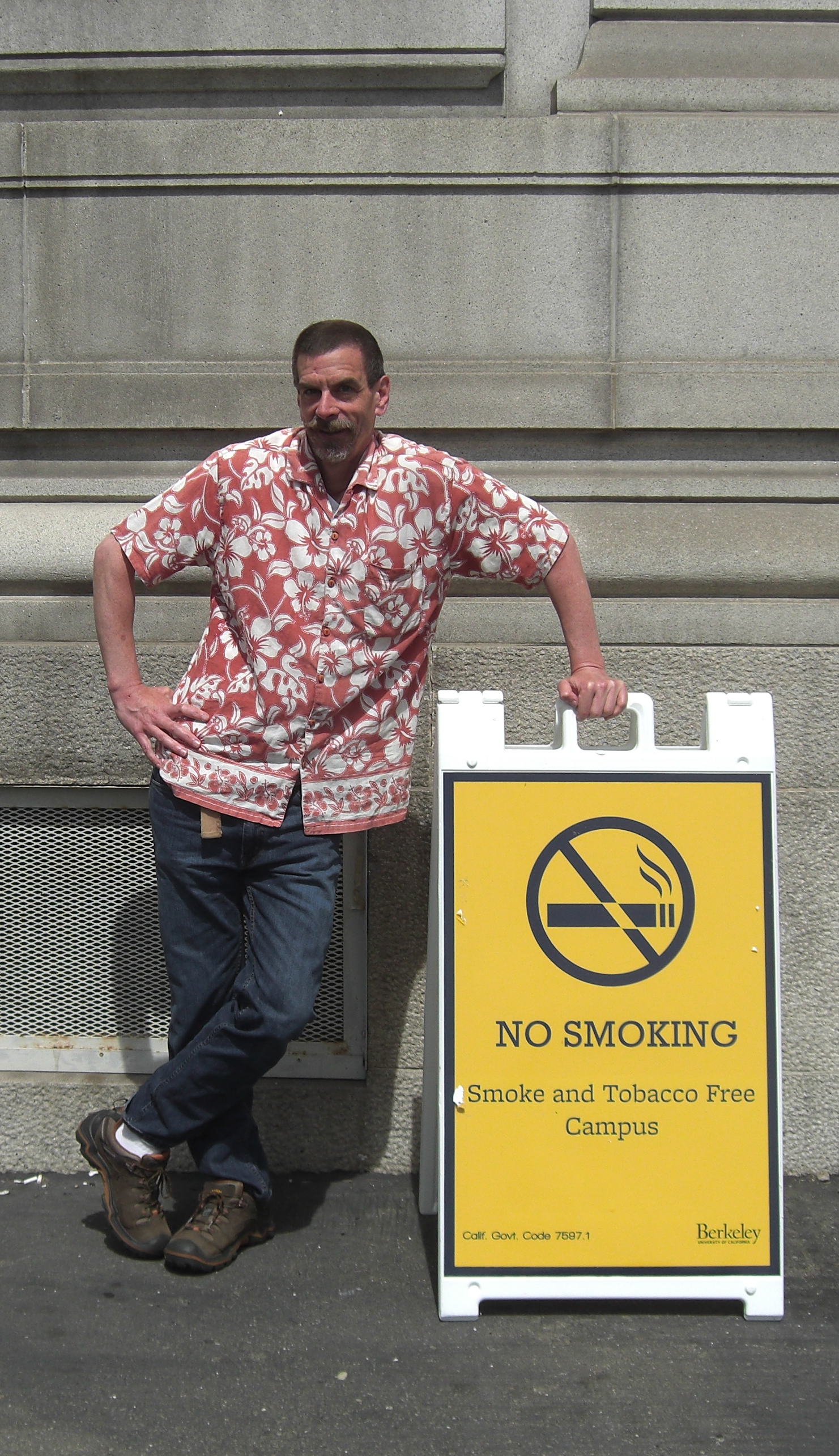Reflections on the known universe… A message like an elephant
by Kurt True

Your author, holding the sign, Walter G. Brown Elementary School.

| Your author, holding the sign, Walter G. Brown Elementary School. |
You want to know how old I am? I'm so old, I can remember a time when cigarettes were advertised on television.
For those of you who weren't around in the days when people smoked in hospital lobbies and the grocery store, that's probably a hard thing to picture, but it's true. There was a time when cigarettes were advertised on television. Honest. Right here in the USA.
Those were some really entertaining ads too. They had the catchiest slogans, like this one: "I'd rather fight than switch." And they had these jingles that you couldn't get out of your head. Us kids used to sing the jingles from the cigarette commercials at recess.
I went to Walter G. Brown Elementary School in Santa Clara, at the corner of El Capitan and Monroe Street. Don't go looking for it. It doesn't exist anymore. If you go to that corner, all you'll see is condos. And the condos look old. That's how old I am. The condos that replaced my elementary school show obvious signs of structural fatigue.
So my elementary school doesn't exist anymore, and, from what I understand, recess doesn't exist anymore, but way back in the bygone days of recess and Walter G. Brown Elementary School and grocery store patrons stamping out their cigarette butts in the produce aisle, us kids used to run around at recess singing jingles that we'd heard on cigarette commercials on TV.
Well, naturally, the civil authorities of the time decided this was all a rather deplorable state of affairs, so about the time I started the second grade, the State of California began conducting an ambitious and elaborate anti-smoking campaign in the public schools.
I remember they made my class watch a movie depicting lab animals strapped into restraints and forced to chain smoke. I felt terrible for the poor little lab animals.
The narrator in this movie, and this was true of many educational films of the era, was a scientist with gray temples who wore a lab coat and talked like a hotel detective in a Marx Brothers movie. I remember the scientist pointing to a diagram or a chart or something and explaining how smoking rotted away your insides. But I didn't pay attention to any of that part of the movie. All I could think about was those poor little lab animals. The grown ups were always telling us to be kind to animals. Talk about mixed messages.
I remember guest speakers coming to the classroom. One lady had all these cross sections of lungs. They were sliced very thin, like deli meat. And us kids passed around all the cross sections of lungs. They were laminated, naturally, so they were safe to handle. The sooty, shrivelled cross sections, the lady told us, came from the lungs of smokers, and the pink, shiny cross sections came from the lungs of non-smokers. And then there were some lightly tarnished cross sections of lung from people who had worked in a coal mine or lived in Los Angeles or something, I don't remember.
There were other guest speakers who showed us models of lungs and, I think, hearts too, those plastic anatomical models that come apart, like a 3-D puzzle. This was all before Howard Jarvis and Prop 13, and the taxpayer revolution and all that, so there was quite an abundance of resources available for this campaign to convince us not to smoke.
And the campaign wasn't just a one- or two-day event. It was part of our curriculum, like multiplication tables or the American Civil War. It went on for weeks. They really made an effort to get all that information in our heads.
And it didn't work. Not for me anyway.

Your author, Berkeley, June 8, 2016.

| Your author, Berkeley, June 8, 2016. |
Well, I guess it worked in the sense that I don't smoke. I have a general idea that smoking is bad for you, but if you ask me to repeat any of the scientific principles that the State of California was trying to cram into my consciousness in the course of this anti-smoking campaign, I couldn't do it. I remember the poor little lab animals and the grotesque, sooty cross sections of smokers' lungs, but all those scientific facts sort of floated above my head for a while and drifted away like so many hot dog wrappers at Candlestick Park on a breezy afternoon in July.
But you know what I do remember from that time? You know what got stuck in my head and never went away? "I'd rather fight than switch."
And this: "KOOL satisfies best."
And this: "Winston tastes good like a cigarette should."
And if I live to be 106, and I don't remember my address or who's President, I bet I'll still be able to sing this jingle:
You've come a long way, baby-yyyy, to get where you got to toda-aaay. You've got Virginia Slims now, baby-yyy. You've come a long long wa-aaaaay.
I think the point I'm trying to make is that the messages that have the easiest time getting into your head and staying there are the messages that aren't dragging a lot of facts and science and reasoning along with them. The messages that get stuck in your head are brief declarations derived entirely from some clever person's imagination.
If you think of messages as living in an ecosystem, where they're all competing for survival, where every message is looking for a little ecological niche where it can settle in and start reproducing, these imagination-derived declarations (Let's call them IDDs for short.) have a sort of evolutionary advantage, don't they? They fit into pithy, memorable slogans. They're intelligible to anyone, because they don't have to seek accomodation within an established belief system or body of knowledge. They can make their home anywhere.
This evolutionary strategy has proven so effective for IDDs, that they've colonized the world, adapting to a wide variety of environmental conditions. Here's an IDD that you probably encounter at least twice a week
"Global warming is a hoax."
It's kind of a catchy-sounding declaration when you think about it. It wouldn't be any trouble to turn that IDD into a jingle, would it?
"GLO-bal WARM-ing is a hoax. It snowed last yeeee-ear in Van Nuy-yyyyys."
You think you can outcompete that IDD with science and logic? Good luck. That IDD can duplicate itself in a hundred thousand online discussion forums in the time it takes you to graph the volume of the Greenland ice sheet from its formation in the mid-Miocene until modern times.
No, the IDD always has a competitive advantage over scientifically derived or evidence-based messages. Think about all those IDDs that were flying around during our recent nation-wide debate over same sex marriage.
"God made Adam and Eve, not Adam and Steve."
"Marriage is between one man and one woman."
"A child needs a mother and a father."
You might have tried to challenge some of those IDDs with science and data. "Actually," you might have said, "longitudinal studies in which social scientists tracked children in a variety of home environments have indicated that both biological and adopted..."
No, forget it. The IDD already beat your evidence-based message. Your message is already twenty-two words long, and you're only half way through your first subordinate clause.
Do you see the problem? The problem is you have a message like an elephant. Your message is slow, lumbering and resource intensive. Your message relies on math and data and perhaps some visual aids. Your message can only survive in a very specialized environment.
So what do you do when your message is a big, slow-moving, resource-intensive elephant, and it's under attack from a lot of swift, hearty, fecund little IDDs? Well, you could try to train your elephant to plod around and stomp on the IDDs, but I don't think that strategy would get you very far.
No, I think my late friend Joe Barker, who had the most charming habit of extending a metaphor far beyond its natural limits, would tell you that what you need to do is to create a big, beautiful habitat for your elephant. You can put in a water feature and some palm trees. Then you make an exhibit space around your elephant habitat. You install some comfortable seating, and maybe a snack bar.
You try to put your elephant in some sort of context that appeals to the popular imagination is what I'm trying to say, or what Joe would try to say, were he still with us.

Detail showing butts under the no smoking sign, Berkeley.

| Detail showing butts under the no smoking sign, Berkeley. |
And Joe, who I feel certain could still squeeze some mileage out of our metaphor at this point, would say that this habitat and exhibit space impose an unfriendly environment upon all those IDDs. All those wiley, scurrying little IDDs will start dying off once you expose them to the sunny, wholesome world of your elephant exhibit.
That was the strategy I had in mind when I started writing my blog, "What I'm Missing," five years ago. I used the blog to package some of the evidence and science about genital cutting in a way that I thought readers would find palatable, entertaining, non-threatening. And I think the blog was successful, overall. It got thousands of hits from all over the world, and I received a lot of positive feedback from parents, activists, health care providers and other interested parties.
But after about twenty posts or so, I found that my content was starting to outgrow the restrictions that the blog format had enforced upon it. I found myself wanting to rearrange the order of entries, for example, or insert new entries in the middle of my blog instead of tacking them onto the end.
I think Joe would have said my elephant needed to relocate to a habitat where it could roam freely and explore its natural inclinations.
So I've moved my elephant. I'm converting my blog into an epub, and you can download the latest working copy of "What I'm Missing" for free right here on kurttrue.net. I'll add a link to it on the home page, and I'll publish a notice every time there's a new working copy available.
And, though I am old, I think I can manage to live long enough to complete the manuscript. Like I said, I don't smoke, and, last time I checked, my BMI was well within the healthy range.
And if I die, you'll at least have the latest working version of "What I'm Missing" online.
Can somebody remember to read one of the funny parts at my memorial service? Thanks.
Kurt True13 jun 2016


